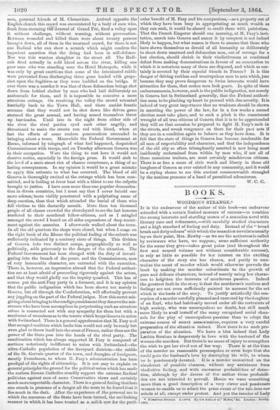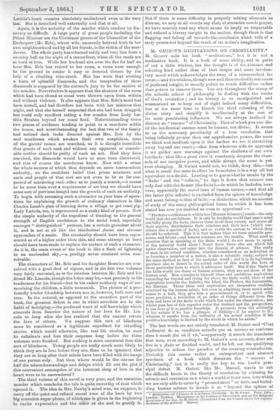BOOKS.
WONDROUS STRANGE.*
IT is the endeavour of the author of this book—an endeavour attended with a certain limited measure of success—to combine the strong interests and startling scenes of a sensation novel with literary care and refinement,—with carefully studied characters and a high standard of feeling and duty. Instead of the "broad brush and dirty colours" with which the sensation novelists usually lay on their paint, Mrs. Newby—as we see the authoress is called by reviewers who have, we suppose, some sufficient authority for the name they give—takes great pains (and throughout the first and secend volume not without considerable success), to rely as little as possible for her interest on the exciting character of the story she has chosen, and partly to neu- tralize the scent of murder which would otherwise pervade the book by making the murder subordinate to the growth of pure and delicate characters, instead of merely using her charac- ters to heighten the interests of murderous passion. Indeed the greatest fault in the story is that the murderess's motives and feelings are not even sufficiently painted to account for the act which is the basis of the story. To justify artistically the con- ception of a murder carefully planned and executed by the daughter of an Earl, who had habitually moved under all the restraints of high society, who was unscrupulous no doubt, but still much more likely to avail herself of the many recognized social chan- nels for the play of unscrupulous passions than to adopt the extreme course of secret assassination, requires a very careful preparation of the situation indeed. Now there is no such pre- paration of the situation. We have a hint indeed that Lady Lestitia Strahan is desperately in love with the husband of the woman she murders. But there is no sense of injury to strengthen the wish to get her rival out of her way. There is at the time of the murder no reasonable presumption or even hope that she could gain the husband's love by destroying his wife, to whom he is passionately devoted. It is a murder committed on the slenderest of possible chances, without any assistance from vindictive feeling, and with enormous probabilities of detec- tion, although by the decree of the author those probabili- ties are not intended to prevail. Hence we want something more than a good description of a very clever and passionate woman to enable us to admit the great event or the tale into our minds at all, except under protest. And yet the interior of Lady
• Woudrous Strange. A horeL By the Author of." Mabel," kc. London: Newby. 1881.
Lretitia's heart remains absolutely undisclosed even to the very last. She is described well externally and that is all.
Again, it is the audacity of the murder which renders its dis- covery so difficult. A large party of great people including the Prime Minister are the Christmas guests of the Chancellor of the Exchequer (Mr. Erie), whose wife, unusually beloved both in her own neighbourhood and by all her friends, is the victim of the mur- deress. The whole party has returned safely and very late from a country ball on the night of a severe frost, when all the roads are as hard as iron. While her husband sits over the fire for half an hour Mrs. Erie has retired to her room, a room near enough to the ground to render it easy to descend thence by the help of a climbing vine-stock. She has worn that evening a tiara of splendid diamonds, and the temptation of these diamonds is supposed by the coroner's jury to be the motive of the murder. Nevertheless it appears that the shutters of the room which had been closed as usual were thrown open from within and without violence. It also appears that Mrs. Erie's maid had been unwell, and had therefore not been with her mistress that night, and that she herself suspected that she had been drugged, but could only recollect taking a few comfits from Lady Lie- title Strahan beyond her usual food. Notwithstanding these two pieces of evidence tending to point to a murderer within the house, and notwithstanding the fact that two of the family had noticed dark looks directed against Mrs. Erie by the real murderess which awaken their own suspicions, none of the guests' rooms are searched, as it is thought incredible that guests of such rank and without any apparent or conceiv- able motive should be guilty of such an act. Had they been searched, the diamonds would have at once been discovered, and this of course the murderess knew. Now with a crime the whole success of which thus depends on mere transcendent audacity, on the confident belief that prime ministers and earls and people of that sort are not even to be so far sus- pected of murdering each other as to justify a search,—it seems to be more than ever a requirement of art that we should have some sort of previous insight into the growth of such an audacity. To begin with assuming such a character as your base of opera- tions for explaining the growth of ordinary characters is like Charles Lamb's plan of burning down a village to get roast pig. Lady Lretitia, too, is represented as a snaky kind of person. Now the simple audacity of the expedient of trusting to the general strength of English confidence iu the social bond, especially amongst" distinguished" persons, has a certain grandeur about it., and is not at all like the intellectual finesse and sinuous approaches of a snake. Her criminality should have been repre- sented as of a higher order than this, and some attempt at least
should have been made to explain the texture of such a character. As it is, the main event of the book is like a flash of lightning in an unclouded sky,—a prodigy never rendered even con- ceivable.
The characters of Mr. Erie and his daughter Beatrice are con- ceived with a good deal of vigour, and in the first two volumes very fairly executed, as is the relation between Mr. Erle and his friend Mr. Lincoln, though the latter may be,—not precisely in his tenderness for his friend—but in his rather motherly ways of ser- monizing the children, a little womanish. The picture of a pro- foundly tender friendship between men is, however, both rare and true. In the natural, as opposed to the sensation part of the book, the greatest defect is one in which novelists are in the habit of indulging,—the profound want of self-knowledge which conceals from Beatrice the nature of her love for Mr. Lin- coln so long after she has realized that she cannot return the love of others. We suppose this sort of blindness must be considered as a legitimate expedient for retarding stories which would otherwise, like real life stories, be sure to culminate and lose their suspense long before the three volumes were finished. But nothing is more unnatural than this sort of blindness. Young people are really much more likely to think they are in love before they are, than to be ignorant that they are so long after their minds have been filled with the image of one person only. But then where would be the- excuse for half the misunderstandings and delays which fill out the plot if this convenient assumption of the innocent sleep of love in the heart were to be surrendered ?
The third volume of this novel is very poor, and the sensation murder which concludes the tale is quite unworthy of that which -opened it. The idea in Mrs. Newby's -mind was, we suppose, to carry off the quiet and refined moral tone of the book by two big sensation sugarldums, of which,crne is given in the beginning to excite expectation and the other at be end to gratify it.
But if there is some difficulty in properly mixing elements so diverse, we may at all events say that, of sensation novels proper, we have scarcely read any which seems to imply so respectable and refitted a literary insight in the author, though there is that flagging and falling off towards the conclusion which tolls of a story protracted beyond the reach of' its wiiter's imagination.































 Previous page
Previous page